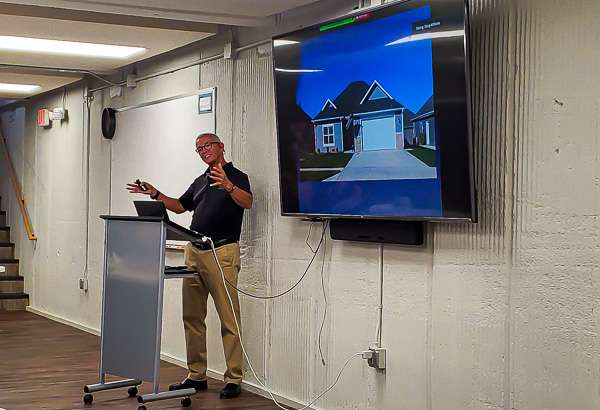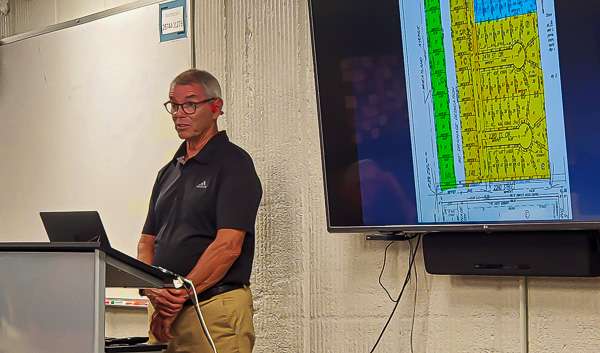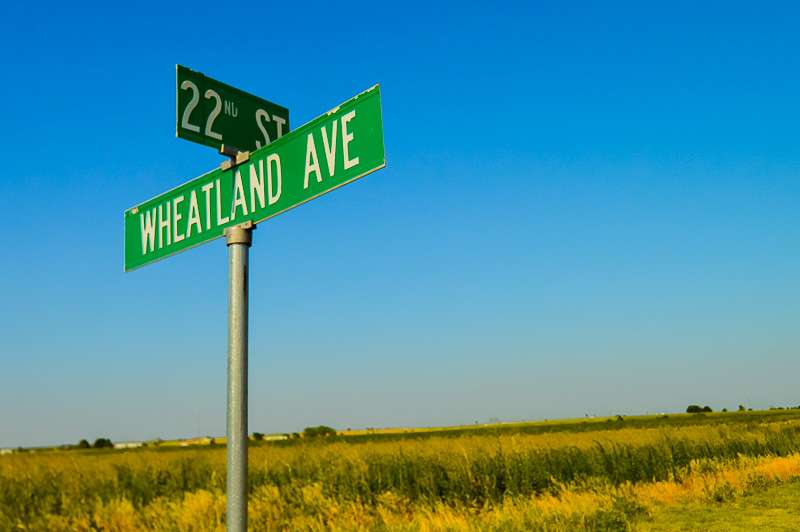
By JAMES BELL
Hays Post
Grow Hays Executive Director Doug Williams believes Ellis County has a problem.
He shared concerns over the amount of housing available in the county and efforts being made to increase housing inventory with area leaders Tuesday at BriefSpace, 219 W 10th, during the Grow Hays Quarterly Luncheon.
“The availability of affordable housing is critical to the recruitment and retention of a workforce in our community,” Williams said. “Without an adequate workforce, we cannot attract new businesses or retain the ones we have.”
He said many business owners in the area frequently struggle with recruiting employees due to the lack of available housing.
Even with the area lacking for homes, the market in the area has remained strong, Williams said, through both the 2008 market downturn and the events of this year.
“But the current situation is worrisome to us,” Williams said.
The average home in Hays is only on the market for an average of 128 days, he said.
“That’s not very long when you consider the loan application
process,"
Williams said.
He said the average sale price is also somewhat “disturbing.”
This year, we have seen an average price increase to $207,000, he said, up from around $180,000 last year.
“That kind of increase has a significant impact on the market,” Williams said.
Overall, he said, the average sale price is up 25.3 percent, the median price is up 19.5 percent and days on the market are down 19 percent.
He said new listings are generating multiple offers with properties frequently selling over the list price as home availability is nearing historic lows.
Low interest rates, Williams said, is a driving factor for the area market.
Currently, there are 65 homes in Ellis County for sale with an average price of $269,000, he said. Only six homes are available in the $175,000- $225,000 range, with an average age of 55 years.
With such low inventory of available workforce housing, Williams said recruiting talent for area businesses is challenging.
“We stand a good chance of not getting those people in our community,” he said.
While the availabity of homes creates need for more inventory, Williams said the strength of the market is a good indicator of the potential for new construction in Hays.
“It’s not all bad, there are some real positives to that, but long term it presents some challenges for us,” he said.
“We have a market, like all markets that is driven by supply and demand,” Williams said. “The market sets the price and we have a real problem with supply and demand right now.”
The challenge right now is finding a better balance.
“We need to try and figure out how to get things back to a reasonable balance,” Williams said.
The solutions
While the problem identified, Grow Hays is working on solutions to bring more housing to the market.
“From a Grow Hays standpoint, we are approaching this in several different ways,” Williams said.
Grow Hays is currently running a housing rehab program, working on bringing a new housing development to Hays through a Rural Housing Incentive District, and working toward increasing retiree housing.
Retiree recruitment
A recent study of the area economy shows retirees as the single largest economic contributor in Ellis County, Williams said.
“We view retirees as a recruitment opportunity,” he said.
Ellis County has many attributes that make it attractive to retirees, Williams said, but without available housing, the area is losing that potential growth.
“So we are looking at some options,” he said. “These are good people to add to the community.”
Grow Hays is working on finding sites for retiree housing projects in the area around HaysMed.
Housing rehab
With older homes in the county in need of rehabilitation, Grow Hays helps to bring those homes to the market through a housing rehabilitation program.
A $400,000 grant from the Hansen Foundation allows Grow Hays to loan funding to buyers to rehab a house in Ellis County that is capped at a $155,000 selling price.
Williams said 11 projects have been completed in Hays, Victoria and Ellis using the revolving loan fund.
“It’s a great program as it is self-sustaining,” Williams said. “We try to keep three or four of these projects going at one time.”
The homes are developed after a developer secures a nine-month loan from Grow Hays to purchase and resell the home.
Williams said most of the homes have sold before or right after they have been completed.
“It’s a great program that improves neighborhoods,” Williams said. “These are opportunities that wouldn’t exist without someone doing this program.”
The program, he said, also creates work and increases the area housing inventory.
Rural Housing Incentive District

The Rural Housing Incentive District was recently approved by the city of Hays, and now the Hays USD 489 Board of Education and Ellis County Commission have the right to veto, but Williams said he believes both groups will allow the development to pass.
“It will be final, if everything goes as planned, on July 25,” Williams said.
The RHID allows the developer to recoup the cost of the infrastructure development by collecting tax revenue after development until the cost of the infrastructure has been covered.
The 75-lot development at 22nd Street and Wheatland Drive is scheduled to be developed in three phases, Williams said.

Contractors are currently being courted, and Williams said seven contractors have already expressed interest in building the homes, which will range in price from $175,000 to $225,000.
“We feel that is the part of the market that is currently being underserved right now,” Williams said.
If everything moves according to plan, Williams said homes will be available relatively quickly.
“Ideally, we will have 20 to 25 homes out there in the next 12-18 months,” he said.
Construction on the homes will begin once the infrastructure has been completed, and Williams is hopeful homes will be ready by next summer.
“Affordability will be quite good in these new homes,” Williams said. "With 75 lots, I think we can stay busy for a while and appeal to hopefully both sides of the equation."






